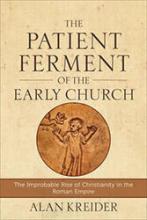Recently, I have become curious about the life of the early church. What did its members believe? What did they preach and what did they practise? More to the point, what did they do that made the church grow? We read of no great missionaries spreading the Word after the time of the apostles. Yet the church grew to the point where, as we know, its erstwhile nemesis, the Roman Empire, succumbed to it in AD 313.
Alan Kreider comes to the early church with questions similar to mine. Fortunately for us, he has done the homework necessary to provide some answers to these questions. In doing so, he enlightens us with findings from his study of early-church writings that are at once reassuring, but also quite challenging.
The reassuring part for some of us who might feel guilty about our poor showing when it comes to bringing others into the church through verbal witnessing, is that this was not how the early church grew. How the church grew was through the witness of the believers’ deeds, their behaviour—or “habitus,” as Kreider refers to it. This is where the “patience” of the title comes in. The first Christians took very literally the biblical injunctions taken from the Sermon on the Mount and other practical teachings of our Lord and the apostles. And it took time and contact with unbelievers to bring this out. New birth was not the result of a dynamic message or a few well-chosen or rehearsed phrases.
So do our lives reflect these teachings in such a way as to make those whose lives we cross notice? Does our behaviour, what we have to say about our prayer life and our worship, interest our co-workers, our families and friends enough to make them want to look further into who we are, into what we “have”? All of this appears to be what “worked” for the early church.
What might have helped make this “work” is the seriousness with which the early church took preparation for baptism. The church seems to have quickly developed a structure of teachers, cathechists and sponsors who rigorously instructed the candidate for baptism in how the Christian life is lived. Only when the candidates’ lives really showed the sought-after change were they deemed worthy of admission to the community and the privilege of partaking in the eucharist and worship with their new family.
Does this sound like we have made things too easy these days? Our current “user-friendly” approach seems to focus first on making our non-Christian neighbours feel accepted and feeling like they belong. Then we hope they will ask the questions that many of us are, in any case, ill-prepared to answer, but that we hope will provide that much-desired opportunity to help them become one of us.
Some of us might want to defensively protest that that was then and this is now. I would encourage you to read The Patient Ferment of the Early Church, and even the early fathers—and mothers—on their own. There might be more than we would care to admit that we could learn from a study of these writings.



Add new comment
Canadian Mennonite invites comments and encourages constructive discussion about our content. Actual full names (first and last) are required. Comments are moderated and may be edited. They will not appear online until approved and will be posted during business hours. Some comments may be reproduced in print.